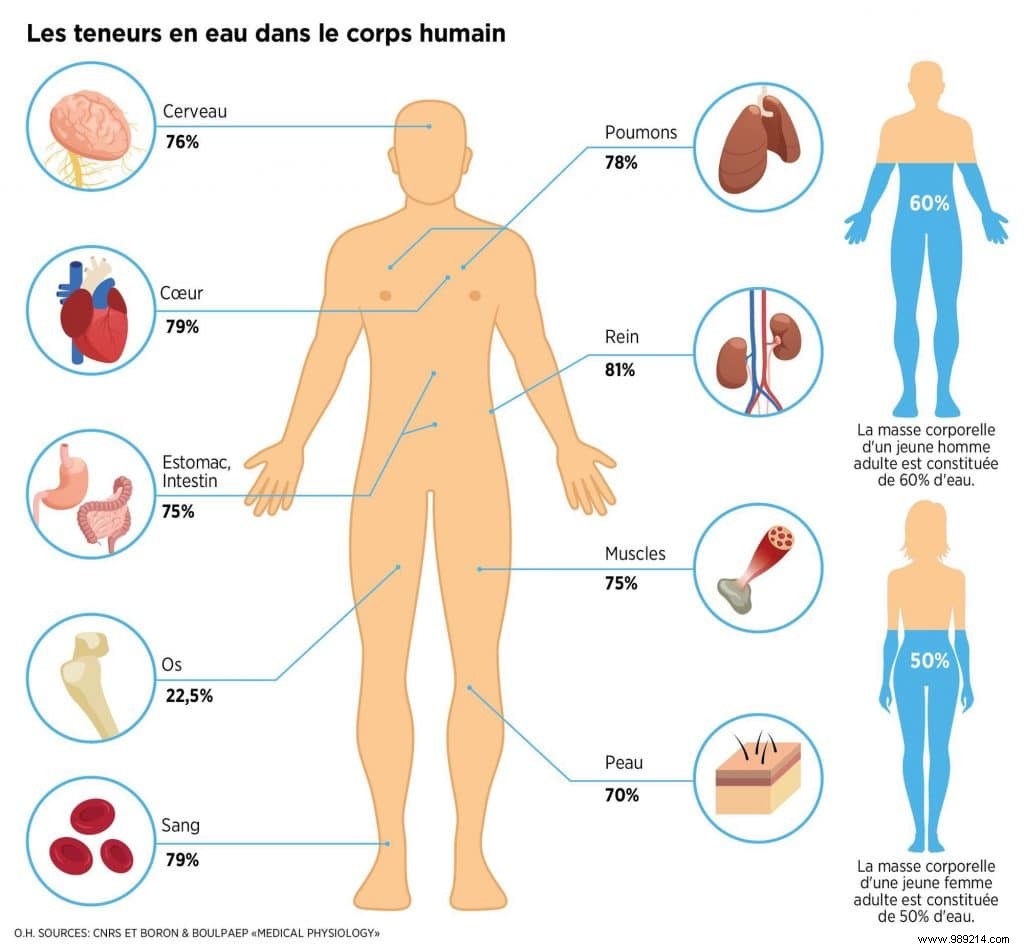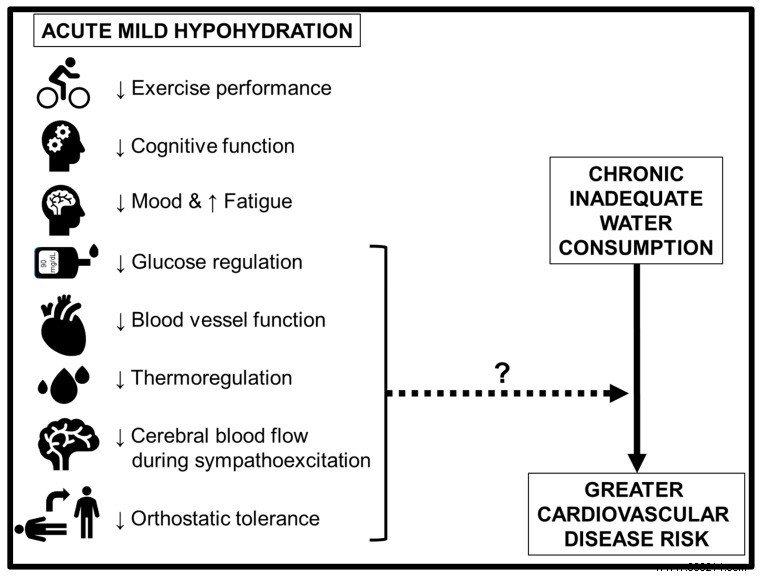Water is essential for the proper functioning of our body and fills it to about 60% (in adults). Real fuel present everywhere and all the time, it facilitates metabolic reactions, digestion, regulates the temperature of our body... Without it, we simply could not live beyond three days. This is also the reason why saving water remains one of the main requirements of life on earth. But why are we mostly made of water and not some other substance?
It is a fact, water is the main constituent of the human body. In adult humans, this essential liquid represents on average 60% of their weight, i.e. 42 liters for a 70 kg individual. In women, this amount is around 50%, because it depends on several factors, including the amount of body fat, which is greater than in men. The leaner a person is, the more water there is in their body. The proportion of water in the body also depends on the age of the individual. Before birth, the human embryo contains more than 90% water, while the newborn contains about 75%. With age, the amount of water in the body decreases, because the older the tissues, the more they become dehydrated (water being replaced by fat).
Inside the body, the proportion of water varies from one organ to another:from 1% in the ivory of the teeth to 81% in a kidney. The other organs richest in water are the heart, the lungs and the brain, sites of many metabolic reactions. Blood is 79% water, while other fluids in the body (saliva, perspiration, lymph) contain more than 95%. Interestingly, muscles contain water in the same proportion as other soft tissues (75%), but due to the high weight of muscle mass, muscles actually contain half of the body's water content!

In reality, water fluctuations (inflows and losses) are permanent between the body and its environment:we speak of water balance. On the one hand, water is eliminated from the body (up to 2.5% of total water) via excretions (mainly urine), perspiration and respiration (at the time of expiration ). On the other hand, this lost water must be compensated by drinking water and food.
This is the reason why it is advisable to drink at least 1.5 liters of water a day - about 1 liter being provided by a normal diet. In addition, the metabolic reactions that take place in the body provide about 0.3 liters of water per day, and a small part is also provided by breathing. Without water supply, a human being cannot live more than two or three days, while he can last about forty days without eating, provided he makes no effort (according to a CNRS file).
Thus, finding a majority of water in our body is not surprising, because it is present in almost everything we absorb, especially liquids, fruits and vegetables. In food products, it even occurs in four different forms:in a free state, bound to colloids (for production and preservation), hygroscopic and hydration (retained by crystalline substances). In the body, most of the water sits inside the cells, while another part occupies the intercellular space, serving as a reserve for cells and blood vessels. The rest, contained in the blood, constantly circulates throughout the body.
An essential constituent of cells, water is a universal solvent and therefore an optimal environment in which all the soluble nutrients in the body can transit. By this same property, it allows the elimination of waste products - resulting from the body's metabolic processes - through the kidneys in the urine.
In addition, it ensures the smooth running of many metabolic processes, including glycolysis necessary for the production of adenosine triphosphate (the energy used for muscle contraction). Water is a weak electrolyte that dissociates into hydrogen ion (H+) and hydroxyl (OH-). These ions have catalytic properties that accelerate chemical reactions, which then take place in seconds instead of days. “Water is the field of action of all the biochemical reactions that define life “Summarizes Bengt Kayser, professor at the Institute of Sports Sciences at the University of Geneva. “All of our machinery can only work in an aqueous solution .
Otherwise, water is essential to facilitate the circulation and digestion of food, moreover provided by drinks and ingested food, and the body itself provides several liters of water to the stomach and to the stomach. small intestine. Most of it crosses the walls of the small intestine and the colon to reach the blood and the lymph, which transport it in particular to the kidneys, the skin and the lungs, the main organs through which it will be eliminated. It also helps maintain a constant temperature inside the body.
A 2020 Japanese study shows that increasing your daily water intake has several health benefits. Of the 174 people recruited for the study, 58 were able to participate:28 in the evaluated group and 30 in the control group. Researchers tested the effect of water supplementation for 12 weeks on biomarkers in blood, urine and saliva. In the evaluated group, two additional 550 ml bottles of water were consumed (one after waking up and one before going to bed) in addition to the usual fluid intake. The average fluid consumption thus increased from 1.3 L/day to 2.0 L/day and the total body water level increased with the associated water supplementation.
“There was no significant change in fasting blood glucose, but systolic blood pressure decreased significantly in the intervention group write the authors of the study. “Furthermore, the existence of a gut microbiome was correlated with a decrease in systolic blood pressure and an increase in body temperature. In contrast, routine water supplementation after waking and before bedtime in healthy subjects with mildly elevated fasting blood glucose levels does not lower these levels. However, it is a procedure that can […] dilute blood waste products and protect kidney function .
On the contrary, the lack of water in the body (from a reduction of 2%) can lead to dehydration, the most common signs of which are dizziness, reduced ability to concentrate, tachycardia with palpitations, visual disturbances , dry mouth… Another study suggests that acute dehydration affects cardiovascular health, among other things, including vascular function and blood pressure regulation. “Observational studies have linked low habitual fluid intake to increased future risk of adverse cardiovascular events, although it is not yet clear how “, write the authors. Dehydration also decreases mental and physical performance, thermoregulation and orthostatic tolerance (ability to stand).

If the water deficit is greater than 6%, there is danger, and at 10%, it is coma and then death. In short, each internal organ needs water to develop and function with optimal parameters. And as nature is "well made", we find in our environment the water necessary to fill this vital and timeless need.